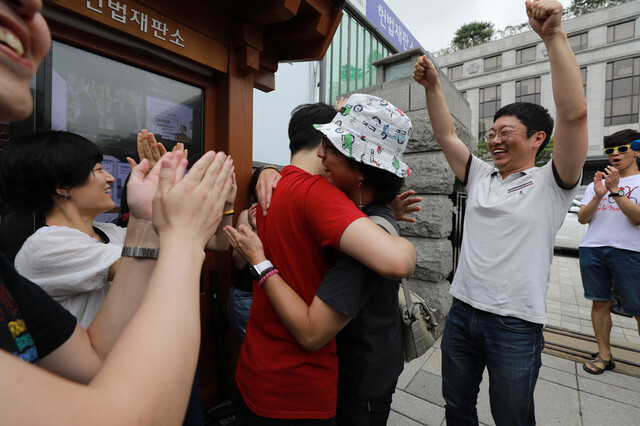hankyoreh
Links to other country sites 다른 나라 사이트 링크
Conscientious objector has sports instructor certifications revoked despite Constitutional Court ruling

“K” is a 24-year-old conscientious objector who chose prison over mandatory military service. Following his release in May 2017, he attempted to acquire three certifications as a sports instructor. He passed both the written and practical examinations in 2018, but he was ultimately disqualified. His certifications as a “lifestyle sports instructor” and “children’s sports instructor,” which he had respectively obtained in 2014 and 2015 before his imprisonment, had been revoked “due to grounds for disqualification.” His record of having violated the Military Service Act had put him in conflict with the “grounds for disqualification for athletic instructors” as established by the National Sports Promotion Act.
In 2018, the Constitutional Court ruled Article 5 of the Military Service Act to be unconstitutional due to its failure to prescribe an alternative means of service for conscientious objectors. In an en banc decision, the Supreme Court ruled that conscientious objection should not be punished as a violation of the act. But matters of compensation and restitution for those who have already been convicted have relied on the individual legal interpretations of government agencies and private sector organizations. Although K was exonerated for the Military Service Act violation in December of last year according to the Amnesty Act, the Ministry of Culture, Sports and Tourism (MCST), which oversees duties related to sports instructor certification, still regarded him as subject to revocation.
The government’s assessment of the follow-up measures adopted since the recognition of conscientious objection remains divorced from reality. A draft version of a fifth state report on the International Covenant on Civil and Political Rights released by the Ministry of Justice (MOJ) last month stated that the government had “implemented special pardons that reversed restrictions on various qualifications, including disqualification from executive service and government employment for 1,878 individuals who had completed sentences for violations in connection with conscientious objection as of Dec. 31, 2019.” It also stated that “necessary measures such as the striking of criminal records have been adopted in accordance with related laws, including the Act on the Lapse of Criminal Sentences.”
But the Act on the Lapse of Criminal Sentences states that a period of five years must elapse for the deletion of criminal records involving sentences of three years or less, as with the punishments of conscientious objectors. Even as the government publicly states that conscientious objectors’ criminal records have been “wiped clean,” they still must put up with disadvantageous treatment for five years.
The Constitutional Court has granted legislators broad discretion to develop restitution measures such as the striking of criminal records for conscientious objectors who have already been convicted. But in the absence of follow-up legislation from the administration and National Assembly, individuals are suffering real damage.
“Five years is by no means a short period of time for a young person,” said Oh Du-jin, an attorney who has represented conscientious objectors.
“While there have been measures at the government level to protect human rights [through special amnesty], we’re seeing reluctance and administrative discrimination at the stage of actual implementation of the particulars [of restitution measures,” Oh explained.
By Jang Ye-ji, staff reporter
Please direct comments or questions to [english@hani.co.kr]

Editorial・opinion
![[Guest essay] The real reason Korea’s new right wants to dub Rhee a founding father [Guest essay] The real reason Korea’s new right wants to dub Rhee a founding father](https://flexible.img.hani.co.kr/flexible/normal/500/300/imgdb/original/2024/0423/8317138574257878.jpg) [Guest essay] The real reason Korea’s new right wants to dub Rhee a founding father
[Guest essay] The real reason Korea’s new right wants to dub Rhee a founding father![[Column] ‘Choson’: Is it time we start referring to N. Korea in its own terms? [Column] ‘Choson’: Is it time we start referring to N. Korea in its own terms?](https://flexible.img.hani.co.kr/flexible/normal/500/300/imgdb/original/2024/0423/3617138579390322.jpg) [Column] ‘Choson’: Is it time we start referring to N. Korea in its own terms?
[Column] ‘Choson’: Is it time we start referring to N. Korea in its own terms?- [Editorial] Japan’s rewriting of history with Korea has gone too far
- [Column] The president’s questionable capacity for dialogue
- [Column] Are chaebol firms just pizza pies for families to divvy up as they please?
- [Column] Has Korea, too, crossed the Rubicon on China?
- [Correspondent’s column] In Japan’s alliance with US, echoes of its past alliances with UK
- [Editorial] Does Yoon think the Korean public is wrong?
- [Editorial] As it bolsters its alliance with US, Japan must be accountable for past
- [Guest essay] Amending the Constitution is Yoon’s key to leaving office in public’s good graces
Most viewed articles
- 1[Column] ‘Choson’: Is it time we start referring to N. Korea in its own terms?
- 2Opposition calls Yoon’s chief of staff appointment a ‘slap in the face’
- 3[Guest essay] The real reason Korea’s new right wants to dub Rhee a founding father
- 4Senior doctors cut hours, prepare to resign as government refuses to scrap medical reform plan
- 5Why Korea shouldn’t welcome Japan’s newly beefed up defense cooperation with US
- 6New AI-based translation tools make their way into everyday life in Korea
- 7[Editorial] Japan’s rewriting of history with Korea has gone too far
- 8Terry Anderson, AP reporter who informed world of massacre in Gwangju, dies at 76
- 9[Column] Has Korea, too, crossed the Rubicon on China?
- 10[Column] The clock is ticking for Korea’s first lady